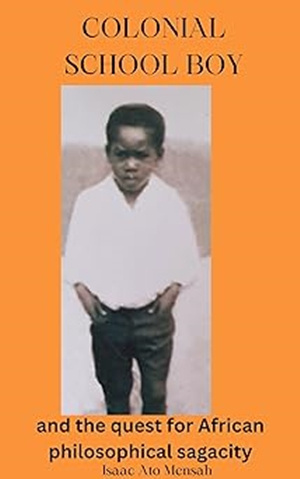The era of British colonisation of Gold Coast was an epoch filled with oppression, strife and tyranny.
It was also a very interesting period as both the Gold Coasters and British learnt from one another; the British gave us formal classroom education while we also took them through a catechism and our indigenous knowledge aka African philosophical sagacity.
The book titled “Colonial School Boy and the quest for African philosophical sagacity” written by Isaac Ato Mensah and published by writersghana.com shares such thoughts in a historical fiction that attempts to illustrate the circumstances of the British colonial administration in a humorous way.
Colonial School Boy, set in the colonial era and running through post independent Ghana, also decries the 1971 Aliens Compliance Order by the Ghanaian government.
The book further explores a theme of forbidden love between George and Araba that can be described as such due to the difference between the literate and the illiterate.
The author leaves the reader with an ethical dilemma to resolve when George and Araba have a romantic moonlight meeting inside a chapel.
The book paints a vivid picture of the British Colonial educational system and its coterminous corrupt Civil Service.
All told, the author attempts to decolonise the curriculum and uphold our own African philosophical sagacity.
The main protagonist, Nii Yemo strove hard to sell his Akpeteshie gin in spite of the attempts the colonialists made to destroy the local market and replace it with Scottish Whiskey.
Nii Yemo started school at the age of nine and thus had the opportunity to imbibe the African philosophical sagacity at home.
This helped to survive the harsh circumstances of the colonial era including “secrets on how to handle corrupt indigenous and European colonial civil servants.”
In one of the chapters we see Opana, a man well-versed in the African philosophical sagacity take on Ian McPherson, a British district commissioner of Scottish origin through a catechesis in a way which is unique to African- accompanied by a trademark drinking style.
The resilience of characters such as Alidu and Naana serve as a poignant reminder that age is just a number which should not pose a barrier to those who wish to do great things like taking up leadership roles among their peers.
Despite his age, Alidu had the courage to address the school assembly, giving a speech that was sure to displease the colonial administration if they caught wind of it.
Naana on the other hand, led a group of her own peers to collaborate by pooling their resources together and supporting one another through the harsh economic challenges of the Gold Coast.
The author also draws our attention to the fact that even among the British there is discrimination between English and Scottish ethnicities using the fictional character Ian McPherson.
I rank the book as suitable for people aged 15 and above.
The paperback version sold by Amazon is 82 pages long with ASIN: B0D142BPDH and ISBN-13: 979-8322235071.
The hardcover version is also 82 pages but with the ASIN: B0CZMB44JH and ISBN-13: 979-8321466483.
The ebook version has the ASIN: B0CQVRGKKJ and is X-Ray Enabled meaning keywords are explained using a special Amazon feature.
Augustine Williams-Mensah is an undergraduate student of the Faculty of Applied Behavioural Sciences in Education at the University of Education, Winneba, and also a Reader at writersghana.com.
Feedback: ato@writersghana.com; WhatsApp, (+233) 0200220353.
Writers and Shakespeares Ghana Limited exist to be a moral and intellectual guide to the best practice of PR and integrated communications around the world, beginning with Ghana.
Opinions of Monday, 13 May 2024
Columnist: Augustine Williams-Mensah
'Colonial school boy and the quest for African philosophical sagacity': A reflection
Opinions














